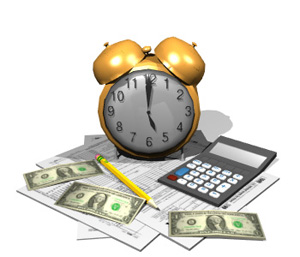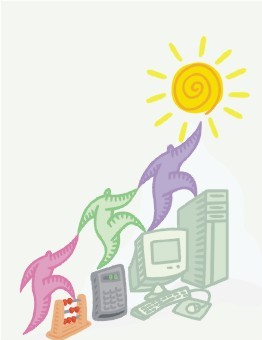 The Ledger
The Ledger
Volume I, Number 2, October 2008
IN THIS ISSUE of The Ledger, we start off with a hilarious redefinition of stock market terms used on Wall Street that is currently circulating on the Internet.
Our Halloween special is a reprint of a macabre little piece from a blog about the dangers of placing too much reliance on online banking and automatic payments, the irony of which is hard to miss.
We finish up with a Tax Tidbits section discussing some changes coming our way as the result of the financial markets bailout.
IN THE LAST EDITION of The Ledger, we waxed poetically about the wonders of online banking, marveling about its advantages. In the intervening period events have occurred that have caused us to tone down our enthusiasm, somewhat. What might that be? you ask. We encountered our first major electronic bill pay SNAFU and it was a big one!
It isn't
 fun making your way through the gatekeepers which banks and others
have established to keep pesky users at arm’s length. You will hit these firewalls whenever
you have a problem that really needs to be handled by a higher authority. You
get to the Guru only after you have been kicked up through a succession of
increasing
levels of competence (I use that term loosely). This is after you have been
transferred through to fifteen different levels because the last fourteen people
you talked to took six hours – this is true, my friends – before they could admit
they couldn’t help. It takes a level of patience few of us possess to see this
process through. I did the only thing I could do: I turned it over to my IT guy.
fun making your way through the gatekeepers which banks and others
have established to keep pesky users at arm’s length. You will hit these firewalls whenever
you have a problem that really needs to be handled by a higher authority. You
get to the Guru only after you have been kicked up through a succession of
increasing
levels of competence (I use that term loosely). This is after you have been
transferred through to fifteen different levels because the last fourteen people
you talked to took six hours – this is true, my friends – before they could admit
they couldn’t help. It takes a level of patience few of us possess to see this
process through. I did the only thing I could do: I turned it over to my IT guy.
Still, since the bank’s Guru identified and fixed the problem things have been running as smooth as glass, and everybody is happy again. But now I know where he lives: I have his telephone and fax number. . .
New Age Stock Market Terms
Ed: Let’s begin with a little levity! I received the following in an email from a friend. It caused me to marvel at our ability to laugh at ourselves in this somber financial climate; it so clearly hits the mark. I only wish I knew who to give the credit to for writing it. Enjoy.

CEO: Chief Embezzlement Officer
CFO: Corporate Fraud Officer (ouch!)
bull market: A random market movement causing an investor to mistake his/herself for a financial genius.
bear market: A 6 to 18 month period when the kids get no allowance, the wife gets no jewelry, and the husband gets no sex.
value investing: The art of buying low and selling lower.
P/E ratio: The percentage of investors wetting their pants as the market keeps crashing.
broker: What my broker has made me.
Standard & Poor: Your life in a nutshell.
stock analyst: Idiot who just downgraded your stock.
stock split: When your ex-spouse and his/her lawyer split your assets equally between themselves.
market correction: The day after you buy stocks.
cash flow: The movement your money makes as it disappears down the toilet.
Yahoo!: What you yell after selling it to some poor sucker for $240 per share.
windows: What you jump out of when you're the sucker who bought Yahoo! @ $240 per share.
institutional investor: Past year investor who's now locked up in a nuthouse.
profit: An archaic word no longer in use.

Halloween Special
Automatic Bill Pay’s Dark Side:
Man’s Death Undiscovered for Two Years
Reprinted from walletpop.blog
Sarah Gilbert, August 6, 2008
 Brian Dean was a private man, one who went to and from his Lancashire,
England home by the dark of night, one who paid his bills on time, and one who
obviously had a quite substantial amount of money in his bank account. Because
when he died in his bed about two years ago, the automatic withdrawals kept
occurring to fund his utilities and other expenses, and no one thought to knock
on the door.
Brian Dean was a private man, one who went to and from his Lancashire,
England home by the dark of night, one who paid his bills on time, and one who
obviously had a quite substantial amount of money in his bank account. Because
when he died in his bed about two years ago, the automatic withdrawals kept
occurring to fund his utilities and other expenses, and no one thought to knock
on the door.
Police officers broke the door down and discovered his body and a huge pile of unopened mail inside the door. It wasn’t reported how they were inspired to check on the 70-year-old Dean.
While this is surely an extreme example of the blind efficiency of modern conveniences – and is an argument for being connected to one’s community – it makes me wonder if setting up automatic bill pay from an account large enough to pay bills for years isn’t ultimately a bad idea. Today I discovered that my Fidelity 401(k) account could be configured to pay bills; and it seems a little too convenient to think that I could sell some stock to pay my water bill. I’ve always thought that keeping investments and savings less accessible and definitely separate from your checking account was the prevailing wisdom. Are we sacrificing too much for ease-of-use?
Ed: There’s obviously a lesson to be learned here, and the author makes some excellent points in the last paragraph. I have never been a fan of automatic payments for several reasons, and rarely use it for a number of reasons: first and foremost being that you can lose control over your bank account. It’s easy to set auto pay up but can be incredibly difficult to turn off, and even more difficult to get a refund when too much is taken out. (Funny thing that, they can get your money out in an instant, but they can’t put it back for weeks, if not months!) Second, people have a habit of relying upon the integrity (uh-oh!) of the biller, assuming the charge is correct. It’s very easy to become complacent, so be on your guard and check the bill behind the charge.
To see the original article go to BBC News at http://news.bbc.co.uk/2/hi/uk_news/england/lancashire/7545118.stm.
Tax Tidbits
Alternative minimum tax.
Stuck behind the $700 billion
 bailout bill that passed Congress and the Senate
in October was a provision to ease the alternative minimum tax burden on
middle-class Americans. This provision affects about 24 million families by
allowing for a personal credit exemption where none previously existed. The bill
also increase the amount exempt from AMT from $33,750 to $46,200 for single
taxpayers, and from $45,000 to $69,950 for married taxpayers.
bailout bill that passed Congress and the Senate
in October was a provision to ease the alternative minimum tax burden on
middle-class Americans. This provision affects about 24 million families by
allowing for a personal credit exemption where none previously existed. The bill
also increase the amount exempt from AMT from $33,750 to $46,200 for single
taxpayers, and from $45,000 to $69,950 for married taxpayers.
To learn more about the alternative minimum tax provisions go to www.abajournal.com.
New filing rules for non-profit organizations. The organization that we all love to hate, the Internal Revenue Service, is close to issuing new rules concerning the filing of form 990 (Return of Organization Exempt from Tax) that will have a big impact on non-profit organizations.
While claiming to minimize the overall burden of filing for NPOs, it
nevertheless adds an increased burden with respect to additional information
 such organizations will have to collect and report. The basic form has been
augmented by two new pages and fourteen new schedules, and has been totally
redesigned. These rules will be effective for tax years starting in 2008.
such organizations will have to collect and report. The basic form has been
augmented by two new pages and fourteen new schedules, and has been totally
redesigned. These rules will be effective for tax years starting in 2008.
The thrust of the additional information is to keep an eye on the governance, management and disclosure which was sorely lacking when lavish spending abuses were brought to light at the Smithsonian and other well-known NPOs like the Red Cross and United Way.
You can find out more about the new rules at www.webcpa.com.
Address your comments and suggestions to Editor, The Ledger. We welcome your feedback. We want to know what you think, what topics you’d like to hear about.
